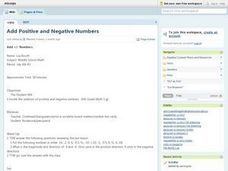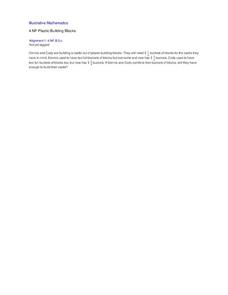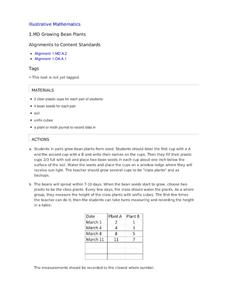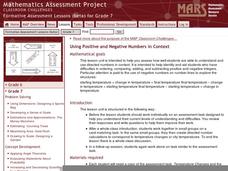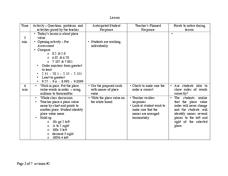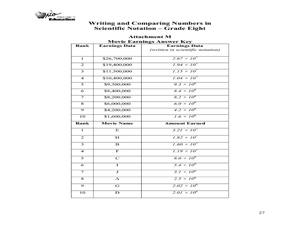Curated OER
Use Models to Compare and Order Integers
Students investigate the concept of integers and how they should occur in the realm of irrational numbers. The lesson includes the use of positive and negative integers. The lesson is a good foundation in order to move into calculating...
Curated OER
Compare Present Day Photographs to Historical Photographs from the Museum's Collection
Eighth graders discuss photojournalism and then compare present day to historical photographs. They discuss how photos capture daily life and historical events, compare historic photos to those seen today, then take and make a photo book...
Curated OER
Add Positive And Negative Numbers
Scholars investigate the concept of adding positive and negative numbers. They practice adding using the number line for scaffolding. This can be done as a game for younger learners, but may also be helpful for engaging the older pupils.
Alabama Learning Exchange
As If Numbers Weren't Complex Enough Already!
The class explores the concept of complex numbers on a website to generate their own Mandelbrot sets. They will practice performing operations with complex numbers and then to get a visual understanding, graph the absolute value of a...
Curated OER
Mastering Math Vocabulary of Prime and Composite Numbers Using Venn Diagrams
Create Venn diagrams. Your class will discover the relationships between even and prime numbers. Next, they will compare that to the relationship between odd and composite numbers.
Curated OER
Comparing and Ordering Greater Numbers
Students line up the digits of the numbers they are comparing in the correct manner. For this comparing numbers lesson, students learn to line numbers up correctly on a place value chart before comparing them. Students then answer...
EngageNY
Comparing Integers and Other Rational Numbers
The ninth installment of a 21-part module has pupils compare integers and rational numbers in decimal and fraction form. They match stories to number lines and compare values in the stories.
Arizona Department of Education
Introduction to Integers
Welcome to the backward world of negative numbers. This introductory lesson teaches young mathematicians that negative numbers are simply the opposite of positive numbers as they use number lines to plot and compare single-digit integers.
Curated OER
Comparing Apples With Apples 1
Elementary schoolers observe and demonstrate how to add and subtract fractions with like denominators. They observe the teacher model a variety of fraction addition and subtraction problems and use fraction strips to complete a worksheet.
Curated OER
Finding Equivalent Forms For Positive Rational Numbers
Learners discuss the relationship between and the equivalent forms of rational numbers. They will convert numbers from decimals to fractions, understanding they are equivalent, but just different forms.
Curated OER
Estimate and Compare Data
Seventh graders explore the values that are used in order to describe data that is collected or given. They compare data using the statistical analysis provided by finding the mean, median, and range.
Illustrative Mathematics
Plastic Building Blocks
Let's build a castle! Dennis and Cody have big plans, but do they have enough blocks between the two of them to accomplish their goal? A great context that requires students to add and compare mixed numbers. Encourage the use of pictures...
EngageNY
Writing and Interpreting Inequality Statements Involving Rational Numbers
Statements often have multiple interpretations — but not these inequality statements. Scholars compare rational numbers and write inequality statements symbolically. The lesson includes problems that require comparing three numbers.
Illustrative Mathematics
Growing Bean Plants
Plant growth experiments offer rich, cross-curricular learning opportunities that can really excite and engage young learners. In this series, children work in pairs planting, measuring, and comparing the height of bean plants in order...
Ohio Literacy Resource Center
Compare & Contrast Essay
Comparing two texts can build a greater understanding of the texts and themes of the works. Take some time to follow the steps here to guide your pupils through the process of composing compare-and-contrast essays.
Illustrative Mathematics
Which Weighs More? Which Weighs Less?
Expand the the comparative language of young mathematicians with a hand-on weight measurement activity. Working independently or in pairs, children compare the weight of large wooden blocks to various other classroom objects, recording...
Illustrative Mathematics
Equality Number Sentences
Understanding the concept of equality is fundamental to the success of young mathematicians. To explore this basic idea, children compare the dots arranged in pairs of rectangles in order to determine whether or not they contain an equal...
Illustrative Mathematics
Longer and Heavier? Shorter and Heavier?
For many young children it seems obvious that longer objects are heavier than shorter objects. This assumption is put to the test as the class investigates the relationship between length and weight in a whole-group activity. Using a...
Lakeshore Learning
Comparing and Ordering Fractions
Math can be satisfying for the mind and the stomach! Incorporate slices of pizza into your fractions lesson with a set of informative resources. After a brief guided lesson on comparing and ordering fractions, young mathematicians...
Illustrative Mathematics
Converting Decimal Representations of Rational Numbers to Fraction Representations
A rational number is a ratio of two integers. Discuss with your class how to convert the rational numbers of repeating decimals to fractions. A good commentary on letting x equal the repeating decimal and multiplying each side of such...
Mathematics Assessment Project
Using Positive and Negative Numbers in Context
Measure the temperature of your math class with a temperature-based lesson on adding and subtracting rational numbers. The thermometer serves as a vertical number line for learners as they work together to solve a temperature change...
Curated OER
Place Value
Practice place value skills with this instructional activity. Learners put numbers in order from greatest to least, identify the values of particular numbers, and engage in an activity to compare numbers using manipulatives.
Ohio Department of Education
Writing and Comparing Numbers in Scientific Notation-Grade Eight
Explore scientific notation in this mathematics lesson plan. Young mathematicians explore multiple representations of large number in scientific notation through the use of models, visual representation and expanded form. The lesson plan...
EngageNY
Comparing Methods—Long Division, Again?
Remember long division from fifth grade? Use the same algorithm to divide polynomials. Learners develop a strategy for dividing polynomials using what they remember from dividing whole numbers.
Other popular searches
- Compare Numbers to 20
- Compare Numbers to 999
- Compare Numbers Lesson Plans
- Compare Numbers to 1000
- Compare Numbers 1 10
- Estimate and Compare Numbers
- Compare Numbers 1 5
- Compare Numbers 1 20
- Compare Four Digit Numbers
- Order and Compare Numbers
- Compare Numbers to 10
- Math Compare Numbers




